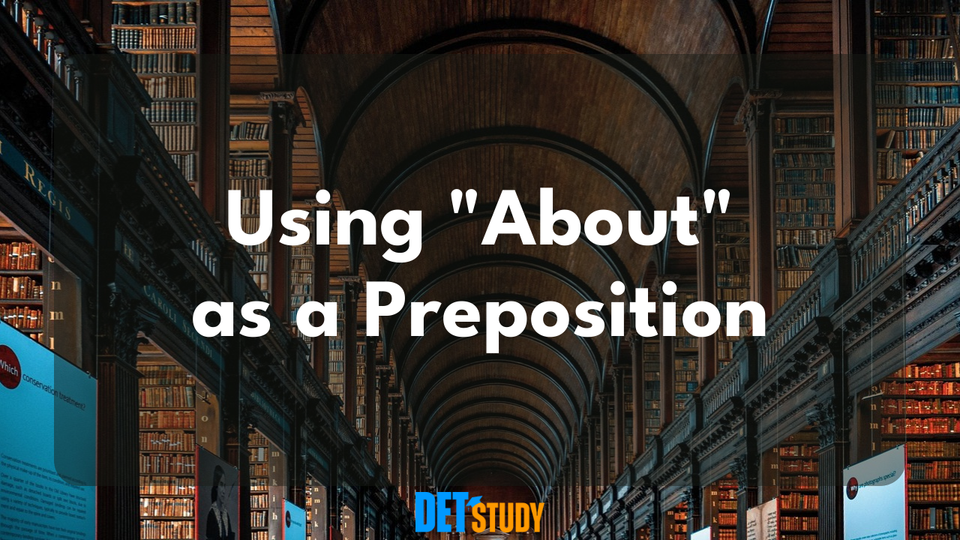How to Use "About" as a Preposition: Mastering English Language Nuances for Enhanced Communication

Understanding the Basics of "About" as a Preposition
All 19 Duolingo English Test Question Types for 2025Understanding the Basics of "About" as a Preposition
"About" is a common preposition in English that can imply various meanings, from indicating a topic to describing an approximate amount or location. Mastering its use can greatly enhance your fluency in English. Let’s explore some key ways "about" is used as a preposition.
1. Indicating a Topic or Subject
One of the most common uses of "about" is to specify the subject of a conversation, piece of writing, or thought.
- Talking about a book: "I’m reading a book about ancient civilizations."
- Discussing a movie: "The movie is about a young girl who discovers a magical world."
- Thinking about an issue: "She often thinks about her future."
2. Expressing Approximate Quantity or Time
"About" can also convey an approximation, whether in terms of quantity, number, or time.
- Approximate time: "The meeting will start at about 3 PM."
- Near a measurement: "There were about 50 people at the concert."
- Close to an amount: "He’s saved about $300 for his vacation."
3. Referring to a Specific Aspect
Sometimes, "about" helps specify a certain aspect or characteristic of something.
- Aspect of concern: "What I love about this city is its vibrant culture."
- Quality of a person or thing: "There is something mysterious about him."
Examples in Context
Using "about" in context can help solidify your understanding. Consider these scenarios:
-
Travel Plans: "We’re planning a trip to Paris. We talked about visiting the Eiffel Tower first."
-
Shopping: "I’m not sure about the size, but I think I need a medium."
-
Learning: "This lesson is about the uses of prepositions in English."
Practice Making Sentences
To get more comfortable with "about," try forming your own sentences. Consider these prompts:
- Describe a book or movie you enjoy: "_ is about _."
- Talk about a recent conversation: "We spoke about _."
- Explain an upcoming plan: "I’m thinking about _."
By practicing with these examples and creating your own sentences, you’ll gain a stronger command of the preposition "about." This word is versatile and valuable for communicating clearly and fluently in English.
Common Usage of "About" in Sentences
Common Usage of "About" in Sentences
Understanding how to use "about" in different contexts can help enhance your English skills. Here are various common ways "about" is used in sentences:
Describing Concerns or Feelings
"About" can express personal feelings or concerns regarding something.
- Concern: "I’m worried about the changes in the company."
- Excitement: "She is excited about her new job."
- Curiosity: "They are curious about the new project."
Discussing Topics or Subjects
"About" is frequently used to indicate the focus of a conversation, writing, or study.
- Understanding a topic: "The lecture was about climate change and its impacts."
- Engaging in conversation: "We talked about our weekend plans."
Indicating Direction or Movement
Though less common, "about" can imply movement around something or someone.
- Movement in space: "He wandered about the garden."
- Moving around: "They moved about the room looking for clues."
Describing Location
"About" can also specify approximate location or position in space.
- Proximity: "The keys should be somewhere about the house."
- General area: "There was a lot of noise coming from about that area."
Highlighting Aspects or Features
"About" can bring attention to particular characteristics or details of a subject.
- Aspect of interest: "What I find fascinating about this species is its adaptability."
- Features: "There’s something about her smile that is contagious."
Examples for Practice
To illustrate how "about" can be variedly applied, here are some practice examples:
-
Books and Media: "I’m watching a documentary about the history of jazz."
-
Daily Life: "He is always thoughtful about his friends' feelings."
-
Events and Occasions: "We had a long discussion about the upcoming wedding."
Creating Your Own Sentences
Create sentences with "about" in various contexts to enhance your understanding:
- Describe feelings regarding a recent event: "I feel _ about _."
- Indicate general observations: "There’s something special about _."
- Discuss location: "He was searching about the room for _."
By practicing these forms and contexts for "about," you can develop a more nuanced understanding of its uses. This will contribute to your ability to communicate more effectively and naturally in English.
Expressing Approximation and Estimation with "About"
In English, "about" is commonly used to indicate approximation or estimation, especially when referring to quantities, times, and distances. It helps convey that the information given is not exact, but rather a close guess.
Estimating Quantities
When you don't know the exact number, "about" can be used to provide a rough estimate:
- Approximate number of items: "There are about twenty people at the party."
- Estimating age: "The dog is about five years old."
Approximating Time
"About" is frequently used in everyday conversation to indicate an imprecise time:
- Time of day: "She’ll arrive about seven o’clock."
- Duration: "The movie lasts about two hours."
Rough Distance or Location
Use "about" to express approximate distances or locations:
- Distance: "The school is about three miles from here."
- Location: "The store is about ten minutes away by car."

Additional Practice Examples
Here are more examples to see how "about" functions in conveying approximation:
- Population Estimate: "There are about 1,000 students at the university."
- Size or Height: "The mountain is about 2,500 meters high."
- Cost Estimation: "The repair should cost about $50."
These examples illustrate how "about" can soften the precision, making communication flexible and allowing for minor uncertainties. By incorporating "about" into your conversations or writing, you can address topics that require less exact figures in a way that is natural and easily understood.
Using "About" to Indicate Topics or Subjects
Using "About" to Indicate Topics or Subjects
When using "about" as a preposition, it often introduces the subject or topic of conversation, thoughts, communication, or inquiry. This is a common and versatile use of "about" in English. Here are some examples and explanations to help you understand how "about" is used in this context:
Speaking and Thinking Topics
"About" can indicate what a conversation or thought focuses on:
- Conversation: "We talked about our plans for the weekend."
- Thinking: "She’s always thinking about her future."
Writing and Learning Subjects
It can also specify the subject of written work or learning:
- Writing: "He wrote an article about climate change."
- Learning: "They’re studying about the history of ancient civilizations."
Feelings and Opinions
When expressing feelings or opinions, "about" helps clarify the object of those emotions or viewpoints:
- Feelings: "I’m excited about the concert tomorrow."
- Opinions: "What do you think about the new policy?"
Questions and Inquiries
In questions, "about" directs the focus toward the subject of the inquiry:
- Inquiry: "Can I ask you about your experience in the program?"
- Clarification: "What is the meeting about?"
Descriptive Contexts
"About" can also describe vague ideas or generalized topics:
- General Interest: "He has a lot of knowledge about different cultures."
- Narrative: "The story is about a young hero’s adventure."
Personal and Social Interactions
In everyday interactions, "about" is often used to discuss personal information or social topics:
- Personal Detail: "Tell me more about your hometown."
- Social Topics: "They had a lively debate about political issues."
These examples demonstrate how "about" functions to introduce the topic or subject in various scenarios, from formal writings and discussions to casual conversations. Understanding how to use "about" in this way allows for clearer and more precise communication, enabling you to express interests or inquiries effectively across different contexts. Practice regularly by forming sentences that incorporate a variety of topics, and you'll soon master this essential aspect of English usage.
Common Mistakes and How to Avoid Them When Using "About"
When learning to use "about" as a preposition in English, students often make certain common mistakes. Recognizing and correcting these can greatly improve clarity and fluency in communication. Here are some typical errors and how to avoid them:
Redundancy
A frequent mistake is the unnecessary repetition of "about" when it's not needed.
- Incorrect: "Tell me about about your trip."
- Correct: "Tell me about your trip."
Misplacement
Placing "about" in the wrong position can confuse the sentence structure.
- Incorrect: "She about is excited the news."
- Correct: "She is excited about the news."
Incorrect Substitution
Using "about" when another preposition is more appropriate can alter the intended meaning.
- Incorrect: "He is concerned about to his health."
- Correct: "He is concerned about his health."
- Also, "He is concerned for his health" is appropriate when implying worry.
Overuse
Using "about" too frequently in close proximity can make sentences awkward.
- Incorrect: "I am not sure about what you are talking about about."
- Correct: "I am not sure what you are talking about."
Inappropriate Context
Using "about" in contexts where it does not fit the conventional meaning can lead to confusion.
- Incorrect: "She is about her career."
- Correct: "She is thinking about her career."
Double Prepositions
Combining "about" with another preposition incorrectly is another mistake.
- Incorrect: "We discussed about the issue."
- Correct: "We discussed the issue."
Proper Use of Related Forms
Sometimes learners confuse "about" with other words like "around" which may change the intended context.
- Incorrect: "The discussion was around global warming."
- Correct: "The discussion was about global warming."
Practice and Awareness
Awareness is key to avoiding mistakes with "about." Continually practicing and applying "about" in different contexts will help. When writing or speaking, take the time to ensure that "about" truly fits the sentence both grammatically and contextually. Practice by rewriting sentences to correct these common errors using examples from your daily conversations or reading materials.
DET Study provides an extensive suite of over 15,000 practice questions, focusing on leveraging adjectives and adverbs to fortify your grammatical skills. Regular practice with these targeted materials ensures that you approach the Duolingo English Test with enhanced confidence and precision, ready to achieve your desired scores.
🎯 Need more practice? Check out DETStudy.com for expert resources, 15,000+ practice questions, and AI-powered writing and speaking feedback.
Frequently Asked Questions (FAQ)
How is "about" used as a preposition in a sentence?
Can "about" be used to indicate approximate time or number?
Is there a difference between "about" and "on" when discussing topics?

